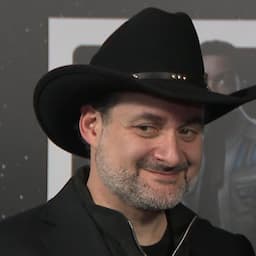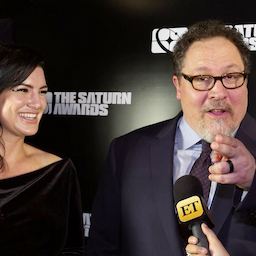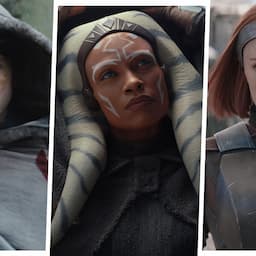A spoiler-filled discussion about Ahsoka, Anakin, Darth Sidious and more.
Warning: This story contains spoilers from the series finale of Star Wars: The Clone Wars.
It's been 15 years in the making, and now, we close the chapter on The Clone Wars with a final four-episode arc that unfolded like a standalone movie in and of itself, catching up to the tragic ending of Episode III: Revenge of the Sith and Darth Sidious' execution of the Jedi-annihilating Order 66.
The Clone Wars originally ran for six season from 2008 to 2014, before it was unceremoniously cancelled -- only to be revived in 2018 for one last season. Now, the final episode, "Victory and Death," is streaming on Disney+, revealing exactly how Ahsoka Tano survives the events of Order 66 and concluding with a Darth Vader moment that is sure to provoke a million fan theories. (Yes! Clone Wars went full-Vader!)
To help us with our much-needed post-finale therapy, executive producer, writer and supervising director, Dave Filoni, spoke with me about bringing the Clone Wars saga to an end once and for all.
ET: This has been so many years in the making, coming down to this very heartbreaking four-part finale. How are you feeling overall now?
Dave Filoni: I feel good. I feel pretty relieved. [Laughs] It is a big deal for me and for everybody that worked on it over the many years. I think you realize what it means to people. These fans that grew up with Clone Wars really were on for the long haul and watched as the show evolved and went from being something pretty simple in its early days -- that we wanted to get better -- and now I think we've finally realized the full potential of the show. It feels good to complete it.
What would you say the biggest challenges were for you wrapping up this story? Because it aligns with this moment in Star Wars history that a lot of fans are very familiar with.
A big challenge, honestly, was just trying to recharge my brain to the entire Clone Wars era. I had been in it very, very deep from 2005 all the way through when we finished it the first time. You have so much information going on. There are so many ways the politics of that time period are important for what's happening in the story. When I went to do the finale -- and I always wanted it to be right alongside Revenge of the Sith -- I had to go back and remind myself of all these moments and make sure that we're not violating anything, that we're not changing the outcome of anything, that things are happening in the right sequential order.
Something as simple as, "Well, who does know about the existence of Darth Sidious?" There were a lot of choices that I made around the storytelling in just that character. One of the keys to telling a story in the prequel time period is that Darth Sidious is almost always a character in the background. Whether he's actively in the episode or not, a lot of things that are happening are happening because of his machinations. He is very much the Phantom Menace throughout the entire storyline of the last four. It was intended that if you have never seen any other episodes of Clone Wars, these four episodes should be enjoyable on their own. That impacted the way I wrote it and the outcome. Yet if you have seen [the show] and you are a Star Wars fan, it should reach a level that's much more immersive for you than just the casual viewer.
How did your plan for this final season change from what you originally thought it would be versus what it ended up being?
There are just things that I couldn't help. I had no idea when we were making Clone Wars that I would ever make a show called Star Wars Rebels. All of those characters and all of those events and the way that I wove Ahsoka and Rex into that story really affected this one. People don't know but some of the original versions that we batted around with this story didn't always have it coinciding with Revenge of the Sith. That's just story evolution. There are many things that happen along the way.
And I'm glad where it went. The only downer, I think, is that for as on the edge I hope people are, they would have been triply so if they'd never seen Rebels. And yet I think writing Rebels and being a part of that show with all the people I worked with there really helped make this version of Clone Wars better. As did working on Mandalorian. You just improve as you go. Had we done this years ago, it wouldn't be nearly as good as it is now.
I gotta talk about that lightsaber battle between Ahsoka and Maul. To see the behind the scenes and learn that Maul was a combo of Ray Park and Sam Witwer was so epic. What was it like for you putting that together and starting to see the combination those two form together?
That's one of those things that you go, "This would be really neat," but you don't know how it's going to be pulled off. We had dabbled in motion capture a long time ago. There's actually some other motion capture in this series -- I mean, there's literally one shot in the other six season that was motion captured and it's one of the Wookies in the "Padawan Lost" arc -- but that type of data tends to be so dense that it's hard for a show like ours to animate to. Well, fast forward many years and technology has improved a lot. ILM had been developing a lot of tools and when I was working on Mandalorian, I was doing a lot of pre-visualization in motion capture. So I was much more familiar with the technology than I was back when I did Clone Wars.
I had seen Ray at a Celebration, so he was very fresh on my mind, and I had talked to Sam about when they did Maul in Solo and what that orchestration was like. I just found it all very interesting and thought, Here's a really rare situation where Sam's such a big fan and has such a respect for Ray, and Ray, obviously, he is Maul, the heart and soul of it. And our animators have always done a great job with our lightsaber fights, but I wanted to find a way to make this last one more special than it had been. Just watching Ray perform, there's a speed there and an intuitiveness that is hard to replicate. So we all went down to the mo-cap stage at Lucasfilm and Ray came in and Lauren [Mary Kim] came in and delivered a fantastic performance.
Ray was so fast at certain spins and stuff that it would break the tracking. It just couldn't track him. The lightsaber would fly out of his hand, virtually, because it couldn't keep up with him. It was a really fun time...I had the floor taped off with all those girders that they were balanced on and I said, "You can only step on these lines," and that just gave this really precarious sensibility. But once you have that virtually, [director Nate Villanueva and I] could take the camera and go under the virtual floor and do all these up angles and get shots that would have been very hard for us to get otherwise. It was just an awesome experience, and I'm glad that people seem to have really enjoyed it.
I know you have conversations with George Lucas. I'm curious if he has seen the finale?
I haven't talked to him about that, so I don't know. Maybe! Who knows? He's a very busy guy, you'd be surprised. He's up to so many things, but his mind, he's so creative and there's always avenues that he's exploring. But I haven't talked to him for a little bit now. I'm sure we'll talk eventually about it. He's thrilled. He loves that we brought it back to do the finish and he likes seeing a lot of that work finding a way to be expressed, finally.
I want to talk about a spoiler. The final, final, final scene of Clone Wars took my breath away.
Oh, good!
It reminded me of towards the end of Rogue One, where you don't expect this thing to happen and then you hear [Darth Vader's breathing]. Oh my God, the chills! Can you talk about putting that scene together and the idea of actually including the fully-formed Vader in the show.
That's an idea that I've had for a very long time. As I went over different ways to end the show, that was always one of the options I had. Ultimately, since Star Wars is a saga about the Skywalker family and Anakin plays a large role in the Clone Wars but also in Ahsoka's life, I felt that if you watch the four parts, as much as Sidious has this hidden layer of character arc in the episodes, so does Anakin. I wanted to draw a full arc for him where if you've never seen Star Wars, you hopefully will be able to understand that the young man that Ahsoka is very good friends with, that's like a brother to her in the beginning, that the villain Maul says, "Hey, he's going to turn out to be this bad guy," in the end you see that, well, that was actually unfortunately true. The through line is the lightsabers that he worked on for her. There's this symbolic arc of Anakin underneath that all.
I mean, I know why I did that and what it means, but I don't like to explain too much. I love for the viewers to watch stuff and come up with their own theories -- and they frankly come up with better things that I intended. But it's a way to have his character expressed without violating anything that happened in the films. It doesn't change anything about Vader. But it helps bridge into the work we did in Rebels, and you can see that whole arc. One of the tragic things for me is that, in her friendship with Anakin, must like him, Ahsoka is going to deny what certain truths might be and not accept certain things because they are terrible. All the way through Rebels, you see that she is not willing to accept what this truth is, even though it's eventually staring her in the face.
It was a nice way to bring a shape to the whole series, that shows you a subversive thing about what the Clone Wars was really about for Anakin, how [Ahsoka] found her way through it intact -- which is what I believe -- and just show that the clones, for all their character and all their individuality, by the end also you have storm troopers walking around who are completely devoid of it. Everything is bleached out. Everything is pretty stark. Everything's washed away color-wise, which is what George did it at the end of Revenge of the Sith. A lot of things I do are just ways of taking what George did and reasserting them, enhancing them, showing that this is what his half of Star Wars is about, ultimately, and how the heroes will prevail through it, despite all of the wickedness of the enemy.
The last moment between Anakin and Ahsoka broke my heart. A lot of times in TV and movies, you know it's the final moment and it's really, really somber. And yes, it was a special moment, but I almost got the vibe of like, "I'll see you later!" And us as viewers realizing that wasn't going to happen, that broke my heart more than anything.
It's a unique situation, because if you know Star Wars, you know so much about what's going to happen and it can make things bittersweet. For the actors, for Dee [Bradley Baker] and Ashley [Eckstein], I had to keep telling them. "You know it's going to happen, but they don't. For this to be successful, you've got to get in that headspace." Because there's no awareness. The hope is this is all going to be over soon. The hope is we're going to get through this. And especially for Anakin, that things are going to get back to normal. He likes the way things are. He's a hero and he's got everything going for him.
The one thing that I felt strongly about was that she's in a different place in life. And he never quite fully gets that when he's with her again, that leaving the Jedi order and meeting Trace and Rafa, those adventures have made an impact on her. I always likened it to the story team as it's like when you leave school for the summer. When you're a kid that summer feels like forever and when you come back, so many things feel like have changed and a lot of your friends feel like could change. You know these people fondly, but it can be awkward at times because that fondness and familiarity seems a bit off when they've made changes. I think a lot of what Star Wars does really well is relates to that everyday life that we have so that the galaxy far, far away feels right down the street. It did to me, especially growing up, and I've just always tried to keep that alive in the work I do.
I could listen to you talk about Star Wars forever. Speaking of Ahsoka, there have been casting rumors percolating. Do you want to see her in a live action world? Do you think that could happen?
To hear Filoni's thoughts on when and where we might see a live-action Ahsoka show up in the Star Wars-verse -- plus all things Mandalorian -- check out part two of our exclusive interview.
RELATED CONTENT:


